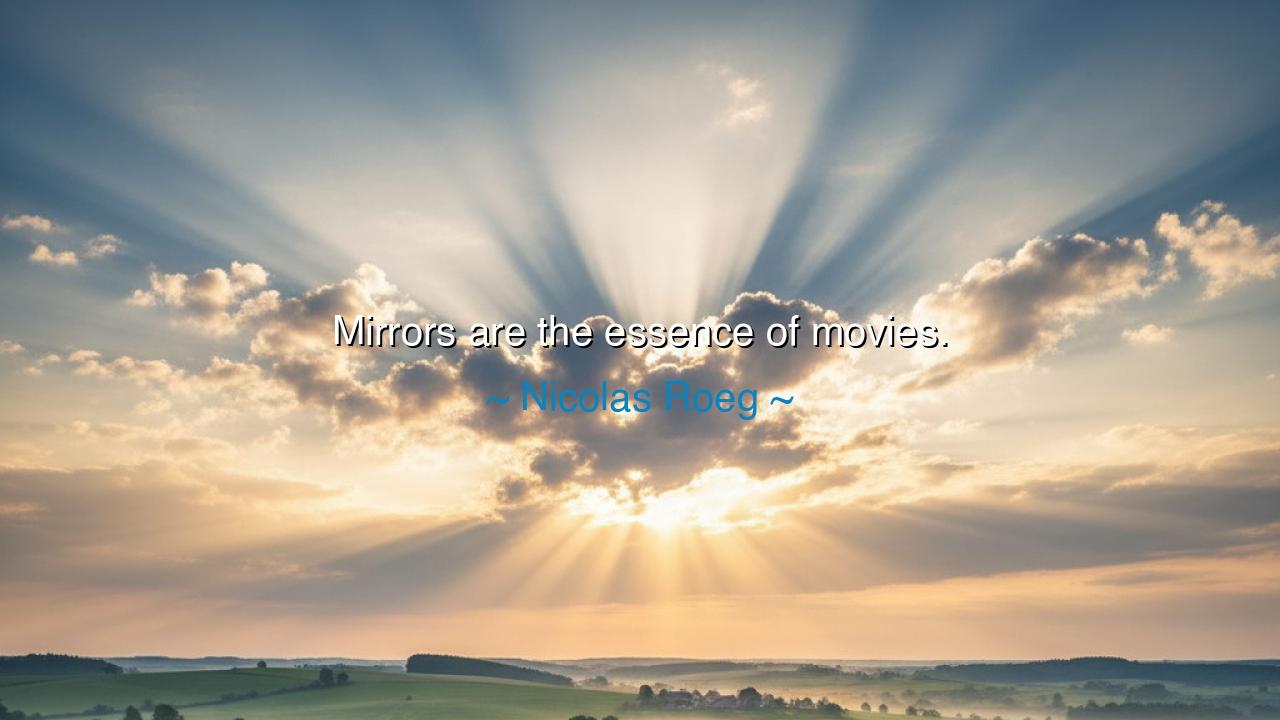
Mirrors are the essence of movies.






Nicolas Roeg's words, "Mirrors are the essence of movies," are like a flame that ignites a deep contemplation on the nature of film, its power, and its ability to reflect the very core of human experience. In this simple but profound statement, Roeg speaks of the mirror as a symbolic and literal device, a tool that allows us to see ourselves, to examine our inner landscapes and the world around us. Just as a mirror reflects the image of the body, so too do movies reflect the soul—they hold up a mirror to humanity, showing us not only who we are but who we could be, who we fear to be, and even who we long to become.
A movie, much like a mirror, does not merely show what is on the surface; it dives deeper, capturing not only the external world but the emotional and psychological states of its characters. Through the lens of the film, we are often forced to confront the truths we may wish to avoid, much as we might feel uncomfortable seeing our own reflection in the glass. Movies—the great storytelling medium of our age—are not mere entertainments, they are reflections of our inner lives, complex, multifaceted, and at times, unsettling. The characters and stories we see on the screen are but echoes of the human experience, reverberating with our own desires, fears, and hopes.
This idea of movies as mirrors connects us to ancient myths and legends, where mirrors were not just objects of vanity, but symbols of deep, mystical truths. Take, for example, the myth of Narcissus, the young man who became entranced by his own reflection in the water, unable to look away. His obsession with the image he saw in the mirror led him to his demise. This myth, though tragic, speaks to a larger truth—the danger of losing oneself in the reflection, of becoming consumed by the image, rather than understanding the deeper reality behind it. In the same way, movies offer us a reflection of reality, but it is up to us whether we choose to see beyond the surface or become lost in the image alone.
Consider the story of Plato's Allegory of the Cave, where prisoners are chained in a dark cave, only able to see the shadows of objects on the wall. They mistake these shadows for reality, for truth, and are unable to see the world as it truly is. The shadows are like the reflections in the mirror, a distorted version of the truth. The true journey of the soul, Plato suggests, is to escape the cave, to see the world in its fullness, and to understand the deeper forces at play. Movies, like the mirrors in Roeg’s statement, offer us the opportunity to escape the shadows and enter the light, to see not just the image, but the deeper meaning behind it.
Just as the mirror reflects the surface, movies reflect the culture and spirit of the times in which they are made. They reveal not only individual stories but the collective consciousness of society. Take, for example, the films made during the Great Depression, like The Grapes of Wrath or Modern Times. These films were not just stories of individuals but mirrors to the struggles of an entire generation, offering insight into the hardships, hope, and resilience of the human spirit during times of great trial. Movies capture the essence of the age in which they are created, and in doing so, they show us not just the faces of the past but offer a mirror to our present and future.
In our own lives, we too are confronted with mirrors—whether literal or metaphorical—that reveal our own truths. Just as a movie holds a mirror to the human soul, so too do we encounter moments in our lives when we must face the truth about ourselves. These moments of reflection are not always easy, for they demand that we see not just our beauty but our flaws, our darkness, and our potential. But just as movies allow us to explore the complexity of the human spirit, so too can we use our moments of reflection to gain wisdom and clarity. Embrace these mirrors, these moments of self-reflection, for they are opportunities for growth, for deeper understanding, and for transformation.
The lesson Roeg offers through this insight is one of self-awareness and authenticity. Just as movies reflect the world, so too should we seek to reflect the truest version of ourselves. Do not shy away from looking into the mirror, from seeing the fullness of who you are, both the light and the shadow. Use the images and stories you encounter to guide you, to lead you on a journey of deeper self-understanding. Let the mirror of film, and of life, show you not just what you want to see, but what you need to understand, and in doing so, may you become not just a reflection of the world, but a creator of your own truth, shaping your path with wisdom and courage.
As you move forward, ask yourself: What do the mirrors of your life reflect? Are you merely seeing the surface, or are you looking deeper, understanding the shadows and light within you? Like the movies, your life is a story—a story that can reflect not just who you are, but who you are becoming. Embrace the reflections, and let them guide you toward the fullest expression of yourself.






AAdministratorAdministrator
Welcome, honored guests. Please leave a comment, we will respond soon